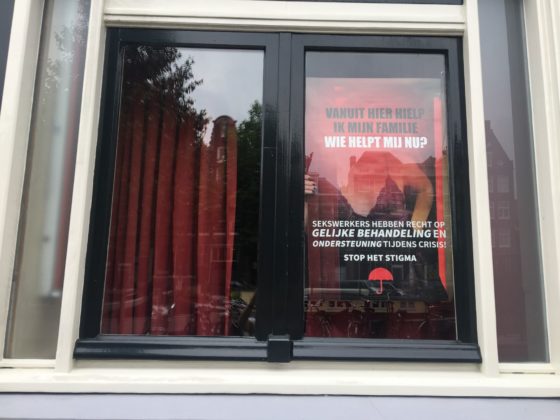Sex worker survey shows most did not get government corona support


About 50% of migrant sex workers returned to their home country while sex work was banned in the Netherlands during the corona shutdown, according to a survey.
The survey of 108 sex workers, developed by the Prostitution Information Centre and SekswerkExpertise network, aimed to find out how much support sex workers received, following signals that some were in financial peril.
More than half of the respondents applied for income support, but only eight were successful, and 26 were rejected outright. The respondents, 77 of whom had Dutch nationality, also estimated that roughly half of migrant workers left the Netherlands for their own countries during the lockdown.
Marjan Wijers, a member of SekswerkExpertise and long-timer researcher in the field of human trafficking, said the survey confirmed reports that some sex workers were in desperate need and felt forced to work illegally.
Support
‘One of the things we were very concerned about is that most of these sex workers fell between the cracks and didn’t qualify for emergency aid,’ she told DutchNews.nl. ‘They were paying taxes, working under an arrangement imposed by the government itself but didn’t have support.’
Wijers said the sample confirmed that many sex workers are employed through a so-called ‘opting-in’ system which means that tax is deducted at source from their workplace, but they are not counted as normal employees and their brothels do not pay their social security contributions.
‘You see opting in in the cultural sector, with some politicians and priests, but the difference is that in all of the other sectors, it is the worker who decides where to use the opting in,’ said Wijers. ‘The sex worker himself or herself doesn’t really have a say and it is basically imposed by the government.’
Workers under this ruling are not registered with the Chamber of Commerce, excluding them from the ‘TOZO’ support ruling during the corona crisis, she said, even if they paid all of their taxes. People working from home would be unlikely to have proper city licenses that would qualify them either.
‘For many, the choice was between eviction or taking the risk of continuing to work: but you should not bring people to choose between hunger and health,’ said Wijers. ‘It has a long term effect if you cannot trust your government.’
Demonstration
Sex workers, who had agreed an industry hygiene protocol and were protesting strongly for more support, were surprised when prime minister Mark Rutte announced they could return to work on July 1.
However, a small demonstration in The Hague was set to go ahead on Friday, to express concerns about the lack of help during corona, including ‘intimidating’ WhatsApp messages sent by authorities to sex workers thought to be illegally working.
The sector has also raised concerns about a new sex work regulation bill, requiring licenses, which five major Dutch cities believe could have negative consequences for vulnerable groups rather than tackling serious issues such as human trafficking and abuse.
‘Some 4% to 10% of all sex workers are thought to be victims of violence or human trafficking,’ added Wijers, ‘and it is difficult to say what the impact on them has been.’
Careful contact: clients return to the red light district as sex work restarts
Thank you for donating to DutchNews.nl.
We could not provide the Dutch News service, and keep it free of charge, without the generous support of our readers. Your donations allow us to report on issues you tell us matter, and provide you with a summary of the most important Dutch news each day.
Make a donation